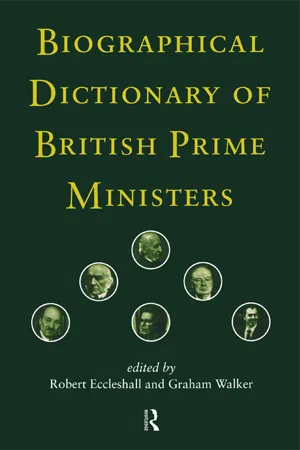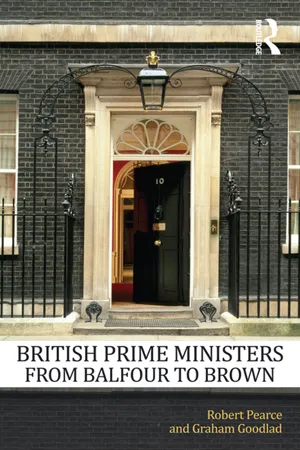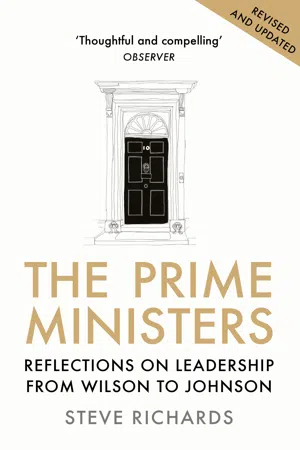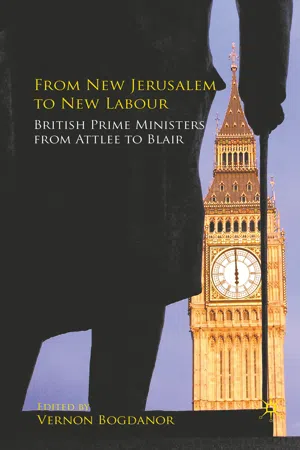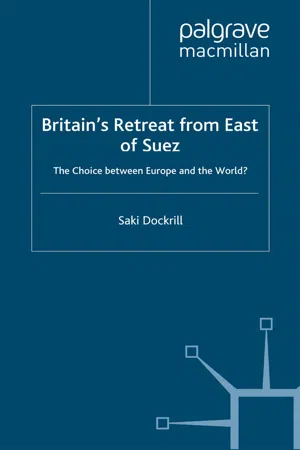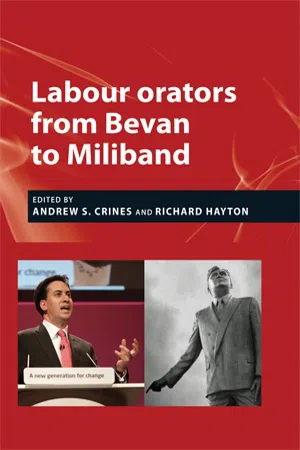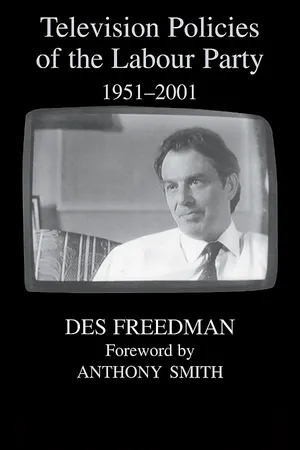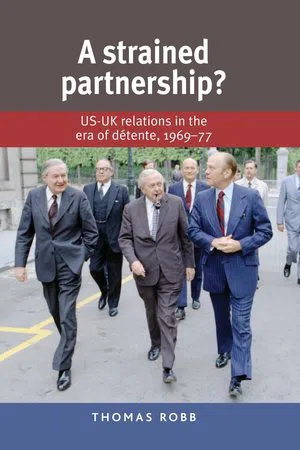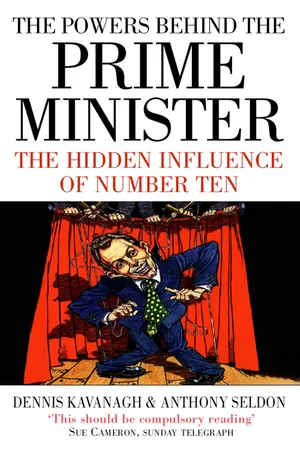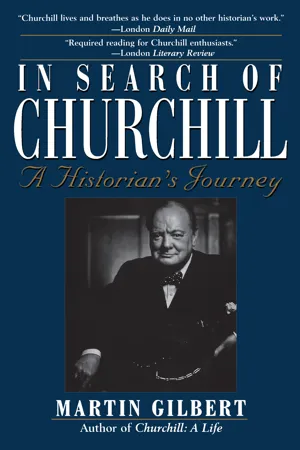History
Harold Wilson
Harold Wilson was a prominent British politician who served as the Prime Minister of the United Kingdom from 1964 to 1970 and then again from 1974 to 1976. He was a member of the Labour Party and implemented various social and economic reforms during his time in office. Wilson's leadership was marked by efforts to modernize British society and improve living standards for the working class.
Written by Perlego with AI-assistance
Related key terms
1 of 5
10 Key excerpts on "Harold Wilson"
- Robert Eccleshall, Graham Walker(Authors)
- 2002(Publication Date)
- Routledge(Publisher)
(James) Harold Wilson, Lord Wilson of Rievaulx
Born 11 March 1916, son of James Herbert and Ethel Wilson. Educated at Royds Hall Secondary School, Huddersfield, and Jesus College, Oxford. Married 1939 Gladys Mary Baldwin, daughter of Revd D.Baldwin. MP for Ormskirk 1945–50 , Huyton 1950–76. Director of Economics and Statistics, Ministry of Fuel and Power 1943–4; Parliamentary Secretary to Minister of Works 1945–7; Secretary for Overseas Trade 1947; President of the Board of Trade October 1947–51; Leader of the Labour Party 1963–76; Prime Minister 1964–70 and 1974–6; Leader of the Opposition 1963–4 and, 1970–4. Resigned 1976. Left Commons 1979; made a life peer 1983. Died 24 May 1995.Harold Wilson has secured a prominent place in British history as Labour’s longest serving prime minister and one of the leading political figures of the post-war period. Yet the nature and significance of his political contribution remain widely contested. Two radically different images recurred in the tributes and assessments which followed his death: according to the first, he was a machiavellian and untrustworthy opportunist; according to the second he was a benign, pragmatic and quintessentially provincial English figure. Both pictures have informed judgements of his political career: while some commentators stress the expediency and disillusionment which characterized government under his stewardship, others celebrate his ability to ride successive political crises and bring stability and good sense to British government.Ever since the crises and disillusionment which accompanied his first spells in office from 1964 to 1970, Wilson has been demonized by sections of the British left who regard his lack of vision and excessive pragmatism as the causes of the betrayal of the radical hopes of his generation (Williams 1968). But in the wake of his death, several commentators and politicians, including the Labour leader Tony Blair, portrayed Wilson as well attuned to the zeitgeist- eBook - ePub
- Robert Pearce, Graham Goodlad(Authors)
- 2013(Publication Date)
- Routledge(Publisher)
14 Harold Wilson (1916–1995) Prime Minister: October 1964– June 1970; March 1974–April 1976‘I am accused of being a tactician … But the truth is I think very long term indeed. Nobody knows what my current long-term strategic thought is.’Harold Wilson in conversation with the journalist Hugo Young, 26 November 1975.1Few Prime Ministers have experienced so rapid or complete a fall in reputation as Harold Wilson. Attaining the highest office for the first time in 1964, for a relatively short period he was widely taken at his own evaluation, as a dynamic, modernizing force, who would equip Britain for the challenges of a new era. By contrast with his privileged Conservative predecessors in Number 10, Wilson came across as a classless, meritocratic individual who had risen to power through his own abilities: a breath of fresh air after the so-called ‘thirteen wasted years’ of Tory rule. By winning a total of four general elections, Wilson set a record unequalled by any other twentieth-century premier. He was the only Prime Minister of the century, apart from Stanley Baldwin, to retire at a time of his own choosing rather than being forced from office by electoral defeat, party rebellion or ill health.On closer examination, however, Wilson’s achievements appear less impressive. He rarely possessed a secure parliamentary majority. In the October 1964 general election Wilson replaced the lacklustre Alec Douglas-Home by a bare margin of four seats. Although he increased this to an impressive majority of 97 in March 1966, he lost to Edward Heath in June 1970. When he returned to Number 10 in March 1974, it was as the head of a minority government; the following October he scraped a wafer-thin majority of three seats. Not surprisingly, therefore, Wilson had little opportunity to implement a programme which might have established him as a great reforming Prime Minister. Even had the political circumstances been more favourable, however, his critics doubt that Wilson would have bequeathed a more substantial legacy. Although often commended for his effectiveness as a party manager and a communicator, he has also been accused of thinking in an exclusively short-term, self-interested manner, with his famous statement that ‘a week is a long time in politics’.2 Bernard Donoughue, who created the Downing Street Policy Unit for Wilson in his 1974–76 administration, regarded him as much shallower than his successor, James Callaghan, for whom he also worked. According to Donoughue, Wilson’s personality possessed just two layers: on the surface, ‘Tricky Harold, the clever and devious political manipulator’ and beneath that merely ‘a kindly, weak and insecure man’.3 - eBook - ePub
The Prime Ministers
Reflections on Leadership from Wilson to Johnson
- Steve Richards(Author)
- 2019(Publication Date)
- Atlantic Books(Publisher)
1
Harold Wilson
Harold Wilson is the most misunderstood of post-war prime ministers. He enjoyed a political honeymoon of intoxicating popularity, with high personal poll ratings and a generous media, from his election as Labour leader in 1963 until soon after his landslide election victory in 1966. Soon after Wilson’s big election win, the way he was perceived changed wildly. Neither his ambitious senior colleagues nor much of an increasingly disdainful media sought to recognize the impossible context in which he made his many energy-draining, stressful and often successful moves. After he ceased to be Labour leader there was little desire to understand Wilson, either. Instead something odd happened. The leader who had dominated British politics during the heady 1960s and for a pivotal part of the dark 1970s became a ghostly figure very quickly. From being the most talked-about figure in British politics for more than a decade, Wilson was rarely referred to. By the time Labour returned to power in 1997 he had become part of ‘Old’ Labour. The Labour Party’s complex past, and its longest-serving leader, were dismissed as being no more than part of a distant chronology that had become irrelevant at best.Yet the present constantly redefines the past. After 2010, the era of large or landslide election wins had passed. Deeply divided parties struggled to govern and to oppose. Once again a referendum on Europe was contested amidst economic turbulence. Suddenly we were closer to the fragile parts of the Wilson era than we were to the landslide parliaments of 1997 and 2001, or to the 1980s when Margaret Thatcher won huge majorities. For the few who bothered to look, Wilson acquired a new relevance. There were lessons to learn. From being a ghost, he had now become a potential guide.After the 1964 election Wilson became prime minister with a tiny majority of just four seats. Ten years later he became prime minister in a hung parliament, and then in one with another puny majority. In order to make sense of more recent events, there is an urgent need to understand Wilson, to return him from the shadows. For most of his leadership he led a deeply divided party. The policies that divided Labour included the UK’s relationship with the EU – or the Common Market, as it was known in the Wilson era. Other divisive policy areas included state ownership and nuclear disarmament. After 2010 there were many echoes from the Wilson era. - eBook - PDF
From New Jerusalem to New Labour
British Prime Ministers from Attlee to Blair
- V. Bogdanor(Author)
- 2016(Publication Date)
- Palgrave Macmillan(Publisher)
93 6 Harold Wilson, 1964–1970, 1974–1976 Philip Ziegler In a recent poll professing to measure the public’s assessment of the success enjoyed by post-war prime ministers, Harold Wilson and John Major came equal bottom. Whether this poll was in any serious way representative of public opinion and what criteria were adopted in deciding what constituted ‘success’ remains uncertain: one cannot pretend, however, that the conclusion was encouraging to anyone concerned for Wilson’s reputation. Students of the period have for the most part treated him with indifference, if not contempt. It would, indeed, be difficult to claim that his years as prime minister were radi- antly successful: I would maintain, however, that, given the problems he faced and the atmosphere in which he was required to solve them, he deserves to be treated with far greater respect than is customarily allowed him. It is hard today to recall the euphoria which greeted Wilson’s accession to power after the election of 1964. In that campaign he had brilliantly, if to a considerable extent unfairly, characterised his opponent, Alec Douglas-Home, as an amiable but tweedily ineffective aristocrat, wholly out of touch with the contemporary world. He had set out his own stall at the party conference at Scarborough in October 1963. For 45 minutes he kept a hard-boiled, sceptical and jaded audience enthralled as he set out his vision of the future. Under Labour there would be a second industrial revolution, creating 10 million new jobs by the mid-1970s by: ‘Planning on an unprecedented scale to meet auto- mation without unemployment; a pooling of talent in which all “classes” could compete and prosper; a vast extension of state-sponsored research; a completely new concept of education; an alliance of science and socialism’. - eBook - PDF
Britain's Retreat from East of Suez
The Choice between Europe and the World?
- Saki Dockrill(Author)
- 2002(Publication Date)
- Palgrave Macmillan(Publisher)
4 Harold Wilson’s aims and objectives On 16 October 1964, Labour came to power with a slim majority of six, after 13 years in opposition. At the age of 48, the new Prime Minister, Harold Wilson, was a determined, pragmatic and astute politician, with 20 years’ experience in politics. Before the election, opinion polls had consistently shown that the Labour leader looked decidedly more ordinary, efficient and energetic than his upper-class conservative counterpart, Alec Douglas-Home. Wilson performed well on television and impressed the British public with his ‘tough’ stance. 5 44 Britain’s Retreat from East of Suez Partly in an effort to divide the Labour Party, the Conservative Party made Britain’s nuclear deterrent an electoral issue, arguing that Britain should maintain its independent nuclear deterrent as a sine qua non for its remaining a ‘first class’ power. Labour insisted that the British nuclear deterrent was not truly independent and that they would re-negotiate the Nassau agreement. The Party fought the General Election on the slogan ‘a new Britain’, promising to modernise society and emphasising the crucial role of science and technology for Britain’s future. Labour also stressed the importance to Britain of conventional weapons, of the Commonwealth and of its East of Suez role. 6 Wilson’s own political outlook was complex: to many critics, even ‘devious’. After a long conversation with Wilson in November 1963, Philip de Zulueta (Macmillan’s former private secretary) wrote to Douglas-Home that ‘it was very difficult to be sure what Mr Wilson’s real views on policy were …. It was also difficult to disentangle what he found politically expe- dient from what he thought right.’ 7 Wilson admired Churchill and Harold Macmillan as great political leaders, and was impressed with the young and energetic American president, J.F. Kennedy. However, as shadow Prime Minister, Wilson had been regarded with considerable mistrust by the Washington political community. - eBook - ePub
- Andrew S. Crines, Richard Hayton, Andrew S. Crines, Richard Hayton(Authors)
- 2016(Publication Date)
- Manchester University Press(Publisher)
3 The oratory of Harold Wilson Michael Hill IntroductionHarold Wilson was first elected to Parliament in 1945 and enjoyed a meteoric rise through the government ranks, becoming President of the Board of Trade in 1947 at the age of thirty-one, making him the twentieth century’s youngest Cabinet minister. He led the Labour Party for a little over thirteen years from February 1963 until his resignation in April 1976. During this time he had two spells as Leader of the Opposition (1963–64 and 1970–74) and served twice as prime minister (1964–70 and 1974–76). Despite this long career within the higher echelons of the Labour Party, Wilson’s ideological beliefs and position within the party have always been hard to pin down and still remain the subject of great debate. As Clive Ponting noted, ‘It is impossible to find out what Harold Wilson really believed, as opposed to what he said and did, about the policy issues the government had to face’ (Ponting, 1989 : 402).Wilson carefully cultivated his public image and ‘wore his roots like a badge’ (Pugh, 2011 : 321). He deliberately contrasted his social background as a working-class Yorkshireman who’d bettered himself through hard work to that of Harold Macmillan and Sir Alec Douglas-Home. He often talked of his love for Huddersfield Town and told the Daily Express that, ‘If I had a choice between smoked salmon and tinned I’d have it tinned. With vinegar’. He always smoked a pipe in interviews and public appearances, but smoked cigars in private (Sandbrook, 2010 ). By contrast Macmillan and Douglas-Home were portrayed as the sons of privilege who had attained their position through their family connections rather than by their talent and diligence. A recurring theme of Wilson’s rhetoric was that Macmillan and Douglas-Home were the embodiment of their party: they belonged to a bygone aristocratic era, were out of touch with the modern world and lacked the skills to govern Britain in the space age. By contrast Wilson and Labour were modern, dynamic and would harness the skills of all social groups in the national interest (Fielding, 1997 - Des Freedman(Author)
- 2004(Publication Date)
- Routledge(Publisher)
3 Harold Wilson and ‘Modernization’, 1964– 70
THE WILSON GOVERNMENTS IN CONTEXT
The Labour government inherited substantial economic problems from the Conservatives when it came into office in 1964. Although British capitalism had expanded massively in the post-war boom, the rate of expansion had started to slow by the early 1960s putting Britain in a weaker position in relation to its international rivals. According to Clive Ponting, ‘[l]ow investment, wages rising faster than productivity growth and the handicap of a large number of declining industries (and an overvalued pound) lay at the root of Britain’s economic problems’.1 In other words, structural economic difficulties were to blame for poor economic growth, a declining rate of profit and an increasing rate of inflation.Labour leader Harold Wilson’s solution was to embrace economic planning; Labour’s 1964 election manifesto promised a national plan that would defeat the Tories’ ‘stop-go economic policy’.2 For Andrew Shonfield, whose 1965 book Modern Capitalism celebrated the productive benefits of indicative planning, it was ‘central to Labour Party thinking that a government of the Left should assume full responsibility for the task of national planning’.3 Wilson promised to set up new ministries of economic affairs and technology and to revitalize the National Economic Development Corporation, set up by the Conservatives in 1962.According to Ben Pimlott, ‘Wilson called for a sensible, gradualist social revolution. The instrument of that revolution was to be the centralized planning of science and technology.’4 The soon-to-be prime minister expressed this vision most famously in his speech, ‘Labour’s Plan for Science’, at the 1963 party conference. He argued that the choice was not whether but how- Thomas Robb(Author)
- 2017(Publication Date)
- Manchester University Press(Publisher)
4 Wilson returns 1974–76 You have to operate on the assumption that Great Britain is through. Henry Kissinger to President Ford, October 1974 1 Introduction Heath’s final months in office were dominated by economic and social prob- lems. Continuing trouble with the trade union movement had resulted in a three-day working week being enforced, and the ongoing oil embargo had led to the British public having to restrict their energy use. This set of circum- stances had led to what one popular British newspaper would term as Heath’s ‘Long agony in No. 10’. 2 Following continuing struggles with the trade union movement, the prime minister decided to call a snap general election under the mantra of ‘Who runs Britain?’ The electorate gave Heath their answer and, in spite of winning the majority of the popular vote, Heath’s Conservative Party failed to achieve a parliamentary majority. Instead, Harold Wilson’s Labour Party had won the largest parliamentary contingent, securing him 301 out of a possible 635 seats. This, however, left him 17 seats short of an overall parlia- mentary majority, and Heath engaged in talks with the leader of the Liberal Party, Jeremy Thorpe, about the possibility of forming a coalition government. Following the inability of the two sides to reach an agreement, Heath was forced to resign as prime minister, and for the third time in a decade Harold Wilson was in office. 3 For scholars studying US-UK relations, three distinct interpretations of Wilson’s final governments have emerged. One interpretation suggests that the US-UK relationship continued to deteriorate in its relevance largely because Wilson returns 129 of Britain’s declining significance as a military and political ally to the United States. 4 Others have contradicted such arguments, insisting that Wilson’s efforts to revive the ‘special relationship’ with Washington were indeed successful.- eBook - ePub
- Dennis Kavanagh, Anthony Seldon(Authors)
- 2013(Publication Date)
- HarperCollins(Publisher)
CHAPTER FOUR Harold Wilson (1974–76)THE ONLY TWO ‘OLD LABOUR ’ PREMIERS during the period covered by this study were, by a strange stroke of irony, also the two most conservative incumbents at Number Ten. Neither Harold Wilson nor, from April 1976, James Callaghan, sought to introduce socialist measures, or to govern in a radical fashion. Few innovations, apart from the Policy Unit, were introduced into Whitehall, and despite the 1970s being the most politically unsettled since the Second World War.Wilson was much changed from the bright, energetic and confident figure of 1964. He looked older than his fifty-eight years. Close aides had noted a sharp decline in his powers of concentration and application. He easily picked up colds and other illnesses and found it difficult to shake them off. In no sense was he a thrusting chief executive. His objective, as in opposition from 1970–74, was to keep the party united in pursuit of moderate policies. He prided himself on his ability to be the only man who could stop the party splitting between the right-wing followers of Roy Jenkins and those on the left who looked to Tony Benn. As party leader in opposition he had paid a heavy price for his earlier cavalier treatment of left-wing resolutions from the party’s National Executive Committee and the annual conference. He would now have to live with a more assertive and suspicious NEC and conference: with trade union bloc votes and an anarchic party structure, it was to prove impossible for Wilson, as it was later for Callaghan, to dominate the party machine. Wilson had also lost much ground with commentators and colleagues as a result of his tortuous balancing act over the European Community whilst in opposition.Wilson may have expected at best to deny the Tories victory in the general election called by Ted Heath on 28 February 1974.1 Deep down, however, he was not certain he had the relish for a prolonged period of office. The difficult and exhausting time as Leader of the Opposition, fighting battles with the left, staving off their attempts to introduce a socialist economic policy, had taken their toll. Age – he would be sixty in 1976 – a sense of ennui, perhaps even the first effects of the Alzheimer’s disease that would later afflict him, and drink, all ground him down: he confided in those closest to him that he would stay on for a limited time only. Had he won in 1970, he had planned to stay on for only two years. After the 1974 election victory his doctor told him in confidence that he should not think of staying on any longer than that two year timespan, advice he followed almost to the day.2 - eBook - ePub
In Search of Churchill
A Historian's Journey
- Martin Gilbert(Author)
- 1997(Publication Date)
- Trade Paper Press(Publisher)
XV
Harold Wilson
During my first two years at Stour, Harold Wilson, then Leader of the Opposition, was much spoken of at Stour, not always with the distaste with which he was regarded by many Conservatives. In 1964, on the eve of the election that brought Wilson to power, Randolph sent him a pink tie as a gift, with a good-luck message (‘The leader’s tie is palest pink, it’s not as red as people think.’) I was on my way to Stour during the election campaign when, at Liverpool Street Station, I saw him in the train setting off for what was to be his triumphal Norwich speech. He offered to give me his signature but declined to sign my Conservative Party election manifesto. He settled for the Evening Standard , the ritual and essential gift I was bearing for Randolph.I had first met Wilson in the summer of 1960, when I was working as a research assistant to the former Manchester Guardian correspondent in India, Taya Zinkin, then writing a book about British reflections on Indian independence. He invited us to the tea room in the House of Commons and I took notes as he talked about Anglo-Indian relations since 1947, when he had been President of the Board of Trade. He crossed my historian’s path again three years later, while I was working for Randolph, and came across a reference to Wilson’s father, James Wilson, a lifelong Liberal who had been Churchill’s deputy election agent at North-West Manchester during the by-election of 1908, a by-election which Churchill lost. It was to Wilson senior that Churchill had made his then radical, and later much-quoted, remark: ‘Had I the powers of a dictator, I would cause the word “Insure” to be inscribed on the lintel of every house in the land.’Churchill died in 1965 during Wilson’s first premiership. The passion of his parliamentary tribute annoyed many in the Labour Party for whom Churchill was always an enemy. Intrigued though I was to know the reason for such a warm encomium, I little imagined that one day I would learn it from the man himself.
Index pages curate the most relevant extracts from our library of academic textbooks. They’ve been created using an in-house natural language model (NLM), each adding context and meaning to key research topics.
